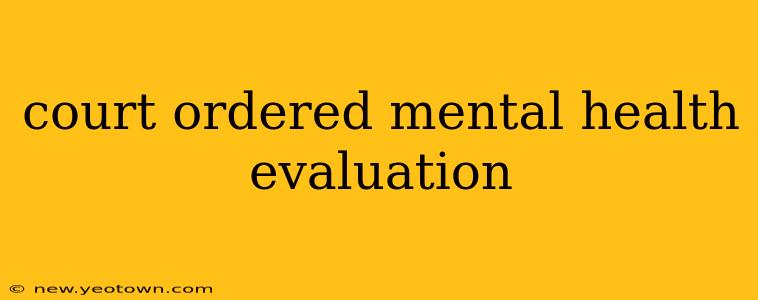Navigating the Labyrinth: Understanding Court-Ordered Mental Health Evaluations
The somber thud of a gavel, the weight of legal proceedings – these are not environments typically associated with mental well-being. Yet, for many individuals entangled in the justice system, a court-ordered mental health evaluation becomes a stark reality. This isn't just a procedural step; it's a journey fraught with uncertainty, often leading to a cascade of emotions and questions. This article aims to illuminate this often-misunderstood process, shedding light on its purpose, procedures, and implications.
Imagine Sarah, a young woman facing charges for a crime she doesn't quite remember committing. Her attorney, recognizing inconsistencies in her statements and observing unusual behavior, suggests a mental health evaluation. This isn't an indictment of her character; it's a crucial step in ensuring a fair and just legal process.
Why are these evaluations ordered?
A court-ordered mental health evaluation isn't about assigning blame; it's about understanding. The reasons for ordering such an evaluation are multifaceted:
-
Competency to Stand Trial: Can the individual understand the charges against them and assist in their own defense? This is a fundamental aspect of due process. If deemed incompetent, the trial is postponed until the individual is deemed competent to proceed.
-
Insanity Defense: This defense argues that the individual, at the time of the alleged crime, lacked the mental capacity to understand the nature and wrongfulness of their actions. An evaluation is critical in determining the validity of this defense.
-
Sentencing: Mental health evaluations can inform sentencing decisions. The evaluation might reveal underlying mental health conditions that could influence the type and length of sentence imposed.
-
Fitness for Probation or Parole: A successful reintegration into society often depends on an individual's mental state. Evaluations help determine their readiness for probation or parole.
-
Child Custody Cases: In contentious custody battles, evaluations can assess the mental well-being of parents and determine the best interests of the child.
What happens during the evaluation?
The process varies depending on the jurisdiction and specific circumstances. However, a typical evaluation might involve:
-
Interviews: Extensive interviews with the individual, exploring their history, current mental state, and circumstances surrounding the legal issue.
-
Psychological Testing: A range of psychological tests designed to assess cognitive function, personality traits, and the presence of any mental illness.
-
Review of Records: The evaluator will likely review medical, psychiatric, and educational records to build a comprehensive picture of the individual's history.
-
Collateral Information: Information from family, friends, and other relevant parties might also be gathered.
What are the potential outcomes?
The evaluator's report will be presented to the court. This report is not a judgment of character, but rather an objective assessment of the individual's mental state. The report might conclude:
-
Competent to Stand Trial: The individual understands the charges and can assist in their defense.
-
Incompetent to Stand Trial: The individual needs treatment to restore competency before proceeding.
-
Not Guilty by Reason of Insanity: The individual lacked the mental capacity to understand the wrongfulness of their actions.
-
Recommendations for treatment: The evaluator might recommend specific treatments or therapies to address any identified mental health conditions.
What if I disagree with the evaluation?
If you disagree with the findings, you have the right to challenge the evaluation in court. You can seek a second opinion from an independent evaluator. This is a critical safeguard to ensure fairness and accuracy.
Can I refuse a court-ordered evaluation?
Refusal to participate in a court-ordered evaluation can have significant legal consequences. The court might draw inferences from your refusal, which could negatively impact your case.
What are some common mental health conditions relevant to legal proceedings?
Several mental health conditions can be relevant in legal contexts. These include, but are not limited to, schizophrenia, bipolar disorder, major depressive disorder, anxiety disorders, and substance use disorders.
How do I find a mental health professional for an independent evaluation?
If you need an independent evaluation, it’s advisable to consult with your attorney who can guide you in finding a qualified and experienced professional.
Navigating a court-ordered mental health evaluation is complex, but understanding the process and your rights is crucial. It's essential to seek guidance from legal counsel and mental health professionals throughout this challenging journey. Remember, this evaluation aims to ensure a fair and just legal process, and understanding its intricacies is your first step towards navigating it successfully.

